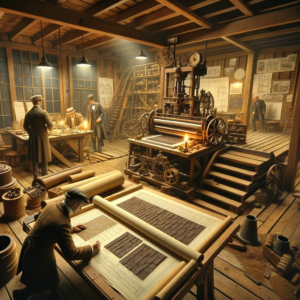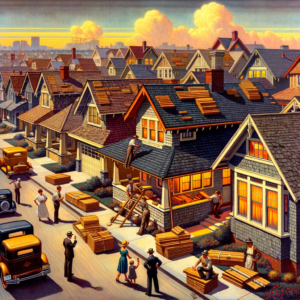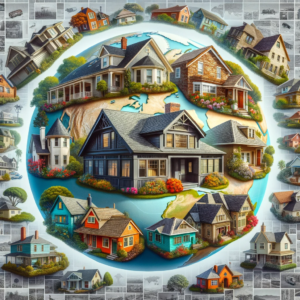
Invention and Early Development (1901): Asphalt shingles were first developed in the United States in 1901. This new roofing material was a significant advancement from the traditional wood, slate, metal, or clay materials that were commonly used at the time. The initial design of asphalt shingles involved saturating felt (made from either wood, cellulose, or later fiberglass) with asphalt, and then coating it with a layer of granules. This process made them water-resistant and durable.
Rise to Popularity (1920s): Despite their invention in the early 20th century, asphalt shingles didn’t become widely popular until the 1920s. This rise in popularity was largely due to advancements in manufacturing processes and the growing demand for affordable and easy-to-install roofing materials in the burgeoning suburbs of America. The economic boom of the 1920s, coupled with the expansion of the middle class and the growth of residential housing, created a perfect market for asphalt shingles.
Advantages of Asphalt Shingles:
- Affordability: One of the key reasons for the popularity of asphalt shingles is their cost-effectiveness. Compared to other roofing materials like slate or metal, asphalt shingles are much more affordable, making them an ideal choice for homeowners on a budget.
- Ease of Installation: Asphalt shingles are lightweight and easy to work with, which reduces the time and labor costs associated with their installation. They can be easily cut to fit any roof shape or size and require a relatively simple installation process.
- Durability and Lifespan: Modern asphalt shingles are designed to be durable and can last anywhere from 15 to 30 years, depending on the quality and maintenance. They are made to withstand various weather conditions, including high winds, hail, and heavy rain.
- Variety of Styles and Colors: Over the years, asphalt shingles have evolved to offer a wide range of styles, textures, and colors. This versatility allows homeowners to choose options that best suit their home’s architectural style and personal preferences.
- Low Maintenance: Asphalt shingles require minimal maintenance compared to other roofing materials. Regular inspections and occasional cleaning are generally sufficient to maintain their condition.\
Environmental Considerations and Innovations: In recent years, there has been a push towards making asphalt shingles more environmentally friendly. Recycled materials are now often used in the manufacturing process, and old shingles can be recycled into new ones or used in road construction. Additionally, reflective or “cool” asphalt shingles have been developed to reduce heat absorption, thereby improving energy efficiency in homes.
Widespread Adoption and Market Dominance: As the 20th century progressed, the use of asphalt shingles spread rapidly across North America. By the mid-20th century, they had become the predominant choice for residential roofing. This widespread adoption can be attributed to a combination of their practical benefits and the growth of suburban housing developments, where cost-effective and easy-to-install materials were in high demand.
Technological Advancements: Over the years, the technology behind asphalt shingles has seen significant advancements. Initially, shingles were made using organic felt material, which was essentially paper saturated with asphalt. This made them waterproof but still vulnerable to fire and weathering. In the 1970s, fiberglass-reinforced shingles were introduced. These fiberglass shingles were lighter, more fire-resistant, and more durable than their organic predecessors.
Aesthetic Evolution: Asphalt shingles have also evolved aesthetically. Initially available in limited colors and styles, manufacturers have expanded options to include a wide range of colors, textures, and shapes. This variety allows homeowners to mimic the look of more expensive roofing materials like cedar shakes, slate, or tile, at a fraction of the cost. Architectural or dimensional shingles, which are thicker and provide a more three-dimensional appearance, have become particularly popular for their aesthetic appeal and added durability.
Energy Efficiency and Sustainability: In response to growing environmental concerns, the asphalt shingle industry has made strides in sustainability. Modern shingles are often made with recycled materials and are themselves recyclable at the end of their life cycle, reducing landfill waste. Energy-efficient shingles, designed to reflect more sunlight and absorb less heat, have become increasingly popular. These “cool roofs” contribute to reducing cooling costs and mitigating the urban heat island effect.
Impact on Roofing Practices: The popularity of asphalt shingles has also influenced roofing practices and standards. Their ease of installation has made do-it-yourself roofing projects more feasible for homeowners. Additionally, the roofing industry has developed specific best practices and installation standards for asphalt shingles to ensure maximum performance and longevity.
 Global Influence: While particularly dominant in North America, the influence of asphalt shingles has been felt worldwide. They are increasingly being used in other parts of the world, valued for the same reasons they are favored in the U.S. and Canada: affordability, durability, and versatility.
Global Influence: While particularly dominant in North America, the influence of asphalt shingles has been felt worldwide. They are increasingly being used in other parts of the world, valued for the same reasons they are favored in the U.S. and Canada: affordability, durability, and versatility.
Asphalt shingles represent a significant innovation in the history of roofing materials. Their evolution from simple, waterproof coverings to sophisticated, durable, and aesthetically diverse components reflects broader trends in material science, environmental awareness, and consumer preferences. As the most popular roofing material in North America, they continue to shape the way homes and buildings are protected from the elements, balancing cost-effectiveness with performance and style.




